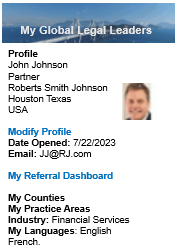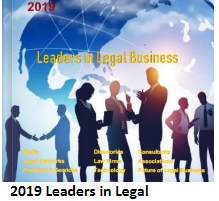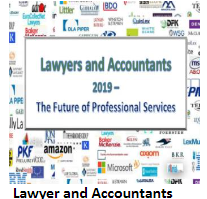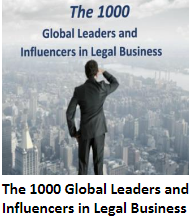Lloyd Pearson Founder and Director, Pearson Communications Pearson Communications
____________________________________________________________________
The best-known directory of this type in the legal sector is Martindale-Hubbell. Formed by James Martindale in New Jersey in 1868, it later linked up with “Hubbell’s Legal Directory,” and the first edition of the “Martindale-Hubbell Law Directory” was published in 1931.
What is a Legal Directory?
The term “legal directories” describes a broad range of products and services that research, list, rank, analyze, and assess lawyers and law firms.
Depending on
whether you are in a large international firm or a small consumer-focused firm,
a directory can be a basic, Yellow Pages-style listing, or synonymous with
preparing detailed written submissions.
Legal
directories are a fixture of the legal industry, and most law firms engage to
some extent with them as a way of promoting their practices to the outside
world.
Legal directories are not new — the first directory, Martindale-Hubbell, began publication in the nineteenth century — but the modern form of the industry took shape in the 1980s and 1990s. Driven by the relaxation of professional rules that limited the ability of law firms to advertise their services, a raft of new products emerged that sought to rank and recommend lawyers.
These directories vary considerably from those that employ teams of researchers to assess the relative qualities of different law firms to those that are more speculative and commercial in nature. Over the years, the number of such products has grown to include several thousand directories, listings, rankings, league tables, and awards.
Why Do Law Firms Work with Legal Directories?
Because Clients Read Them
Arguments rage over the extent to which clients read and value legal directories. While directories are rarely the biggest factor that influences buyer behavior, numerous surveys show that consumers of legal services read directories, and that directories play a role in helping them to decide which law firm to select.
Some companies insist that only law firms featured in certain directories, or those that have attained a certain ranking, will be considered. Other clients use directories to assemble a shortlist of potential law firms, to narrow down a long list of potential advisors to a shortlist, and to locate specialist firms in unfamiliar jurisdictions.
Buyers of legal
services treat directories as a “tiebreaker” to choose between two potential
firms who are otherwise equal in all respects — the higher-ranked firm will get
the job.
All industries have their own ways to recognize professional achievements, but the directories industry is proportionally larger and more influential within the legal sector because of the fragmentation of the profession.
Despite the
consolidation of the industry through law firm mergers and the emergence of
global “mega-firms,” the largest law firms in the world still only account for
a small percentage of market share.
A buyer of legal services can choose from a large range of potential providers for most projects. That creates demand for legal directories, as law firms seek to promote and differentiate themselves from other firms in the market.
Law firms make
claims about their skills, expertise, and experience through promotional
channels such as the firm’s website, brochures, newsletters, and social media,
but prospective buyers of legal services may be skeptical about those claims or
find it difficult to verify them.
On the other hand, an independent assessment from a credible organization, such as an award given out by a prestigious legal publisher or a top-tier ranking in a respected legal directory, will often carry more weight. Law firms should continue to tell clients directly about their strengths, but prospective buyers of legal services want to hear an unbiased voice — and directories provide that.
Naturally much
of their work is sensitive and takes place behind the scenes, but occasionally
they work on a career-defining case or transaction that leads to a great
outcome for a client.
Directories recognize such achievements, and celebrate the excellence and success of lawyers. Everyone wants to be part of a winning team, and a strong legal directory performance is good for internal morale within law firms.
Law firms are low key and will rarely grab the headlines in the mainstream news and business media, so specialist publications like legal directories have emerged to publicize law firms’ activities.
Directories will typically request written information from law firms to enable them to learn more about their work. Law firms engage in this process because it provides a valuable outlet for them to raise their profile and bring the quality of their work to the wider market — to clients, prospective buyers of legal services, potential hires, students, and others involved in the legal sector.
This is a straightforward listing of law firms, broken down by a range of categories such as location and practice.
The best-known directory of this type in the legal sector is Martindale-Hubbell. Formed by James Martindale in New Jersey in 1868, it later linked up with “Hubbell’s Legal Directory,” and the first edition of the “Martindale-Hubbell Law Directory” was published in 1931.
Later owned by
the LexisNexis division of Reed Elsevier, the product became the major force in
legal directory publishing in the twentieth century.
Martindale has passed into new ownership in recent years and refocused as a marketing services provider for smaller law firms. As the internet took off in the mid-to-late 1990s, a new generation of online directories emerged.
HG.org (formerly
Hieros Gamos) was one of the early pioneers in the legal directory world, with
its online site dating back to 1995.
That was soon
followed by Lawyers.com (later owned by LexisNexis), FindLaw (Thomson Reuters),
and others.
Avvo, which
launched in 2006, has become the most heavily trafficked legal directory —
offering a modern take on the traditional lawyer listing with a host of
additional features, such as online reviews, question and answers, and a
proprietary scoring system.
Other prominent
directories of this type include Justia, Nolo (now owned by Internet Brands,
the new parent of Martindale-Hubbell) and LawInfo (Thomson Reuters).
Yelp.com and
other consumer review sites are also popular in the consumer legal space.
At the time of
writing (October 2017), Best Lawyers, in partnership with U.S. News & World Report, has just announced the launch of a comprehensive
listing directory that will feature every lawyer in the U.S. — 1.3 million
people.
As a lawyer, or
a law firm, no longer were you simply listed in a directory, but you were
formally endorsed after picking up recommendations from other lawyers.
The key mover was Best Lawyers. Formed by two Harvard graduates, Steven Naifeh and Gregory White Smith, Best Lawyers established a leading lawyer directory around the concept of “peer review.” Lawyers would only get labeled a “Best Lawyer” and listed in the directory if they received enough recommendations from other lawyers in private practice.
Other businesses
followed their lead, and by the 1990s, the likes of Super Lawyers (launched in
Minneapolis, and now owned by Thomson Reuters), Who’s Who Legal (from the U.K.-based
Law Business Research), Expert Guides (Euromoney), and others produced similar
products.
Research/Submission
The founders of
Chambers & Partners and Legalease (Legal 500), respectively, pioneered a
new concept in legal directory publishing in which law firms were asked to
prepare written submissions highlighting their achievements over the last year.
Teams of researchers and editors would review the materials and supplement them with interviews with lawyers and clients. Once the research was finalized, the directories published tiered rankings of firms and lawyers, broken down by practice, with accompanying editorial commentary.
It was novel
idea in the 1980s and 1990s: before the internet, when information about law
firms was scarce, and when law firms were far more private about their
dealings.
The
Chambers/Legal 500 formula has been successful over the last 20 years, despite
competition from technology-driven rivals, and both organizations have expanded
globally to the point where most commercial law firms of a certain size are now
exposed to them and/or engage with them.
Further
directories of this type emerged in the 1990s, such as Practical Law Company’s
Global Counsel 3000 (later, “PLC Which Lawyer?”) and variations limited to a
particular practice or industry — Euromoney’s IFLR1000 and Benchmark
Litigation, for example, or the IAM Patent 1000.
A U.K. concept
originally, similar products were established in markets such as Canada
(Lexpert), Germany (Juve), Latin America (Latin Lawyer 250), and Asia (Asialaw
Profiles)
Research-led
directories such as Chambers & Partners and Legal 500 are considered to be
the most sophisticated type of legal directory and are most favored by large
business law firms because of their more rigorous methodology and selection
process.
Because of the
expansion of these products, the largest law firms send more than 1,000
submissions a year to various directories and awards organizations, and employ
staff to manage the submission process.
Chambers, Legal
500, and others draw their revenue from firms advertising in the directories,
although the placement of ads and profiles does not influence the performance
of the firm in the independent research assessment, and this “arm’s length”
model gives these directories credibility.
As repositories
of large amounts of market feedback on law firms, Chambers and Legal 500 have
branched out in recent years to offer customized private research reports for
law firms that provide greater levels of feedback and analysis of firms’ market
positions than is made available publicly.
Companies like
BTI Consulting and Acritas have also developed successful businesses based on
legal market research and client feedback, presented through surveys and
rankings.
The Financial Times “Innovative Lawyers” has blazed a trail over the last 10 years, and U.S. News & World Report, which partnered with Best Lawyers in 2010 to produce the “Best Law Firms” survey, is a major player in the U.S. In addition, there are many other surveys that cater to all areas of the legal sector — whether it’s the annual American Lawyer Litigation Department of the Year, or IFLR’s Middle East Deal of the Year, or the annual Global Competition Review 100 survey.
Outside of legal publishing, most industry sectors have a healthy trade press. As well as covering news and features, many produce an annual survey or supplement akin to a directory — and they will often include lawyers.
While the
circulations of such journals and magazines are lower than the more
comprehensive, multi-practice, multi-country directories, their focus is a
strength.
Lawyers want to
get noticed by the people who work in the industries that they advise on, so
with dedicated teams of journalists who know their field, such surveys and
directories can be influential within a certain niche.
There are too
many to mention, but whether it’s private client or healthcare or intellectual
property, lawyers should always consider promoting their practice to
industry-focused publications.
Awards
are distinct from directories to some extent, but they perform a similar
function, and are often produced by the same legal and business publishers that
run annual directories and surveys, and draw on the same resources.
Hundreds,
if not thousands, of awards cater to almost every legal practice, industry, and
market.
Many league tables originated in the 1990s as demand rose for more sophisticated and transparent deal reporting. The likes of MergerMarket, Dealogic, Thomson Reuters, Bloomberg, and others are well known in this space.
For many deal-focused firms, league table performance is just as — if not more important — than how they fare in directories. As well as areas that lend themselves easily to deal reporting — M&A, finance, capital markets, project finance — league table-style surveys are prevalent in other practice areas where quantitative data can be collected, measured, and assessed. For example, there are surveys that list those law firms handling the most patent prosecutions filed at the patent office.
Surveys show
that a large percentage of buyers of legal services, particularly in the retail
and consumer sectors, search for information about lawyers online.
When they do go online, Google is often their first port of call, and that will lead them to law firms’ own websites, legal directories, blogs, news articles, and other sources of information about lawyers. It is clear, therefore, that lawyers need to manage and maintain a strong and credible online presence.
Securing high
visibility on Google is paramount for some lawyers and firms, and an industry
of experts in search engine optimization (SEO) has built up to help lawyers
secure online prominence.
Several online
directories exist to provide law firms with a means to list themselves to gain
greater search engine visibility.
LinkedIn has
become arguably one of the largest legal directories in the world, with buyers
of legal services regularly using the site to check out potential partnerships.
Traditional
print-based legal directories are also getting in on the act, with Chambers
& Partners launching its own “ChambersConnect” network in 2016.
Trade Associations
While they lack
the dynamism of private sector offerings and they do not offer law firms the
opportunity to differentiate themselves from other firms (the format being
largely a member list), they can be a useful means of identifying lawyers
officially licensed to practice in certain jurisdictions.
Notably, the
Association of Corporate Counsel developed a “Value Challenge” to highlight
those firms providing a high level of value when delivering legal services.
Some are outright scams while others are legitimate, but make exaggerated claims about the quality of their products and readership. Law firms should develop guidelines that enable them to focus on more credible products and not those with questionable value.
Skeptics have written off legal directories for 30 years, but they have proved to be remarkably resilient and adaptable.
The legal sector has entered a new era: one shaped by technology, social media, globalization, emerging markets, the fallout from the financial crisis, competition from alternative providers of legal services, and a heightened sensitivity to cost. In response to these shifts, sites like Avvo have blended the concept of a traditional legal directory with features borrowed from the consumer world like ratings, user-generated content, reviews, and question-and-answer forums.
Indeed, some
directories, like Avvo and others, have become quasi-providers of legal
services themselves — offering low-priced fixed-fee legal services to
consumers.
Offering a
counterpoint to the qualitative directories that have been in the ascendancy in
this last 15-to-20 years, the likes of legal analytics company Premonition have
entered the legal rankings space by using artificial intelligence to extract
information from public court documents to find out how many cases firms won or
lost.
On the horizon
you have the likes of the Meisterline Index, which uses cognitive science to
measure the expertise of legal specialists.
It is likely therefore that the directories of the future will like combine elements of both objective (fact-based, measurable) and subjective (opinions, interpretations, points of view) research to create powerful information platforms.

 Software
Software Law
Law Legal
Legal






